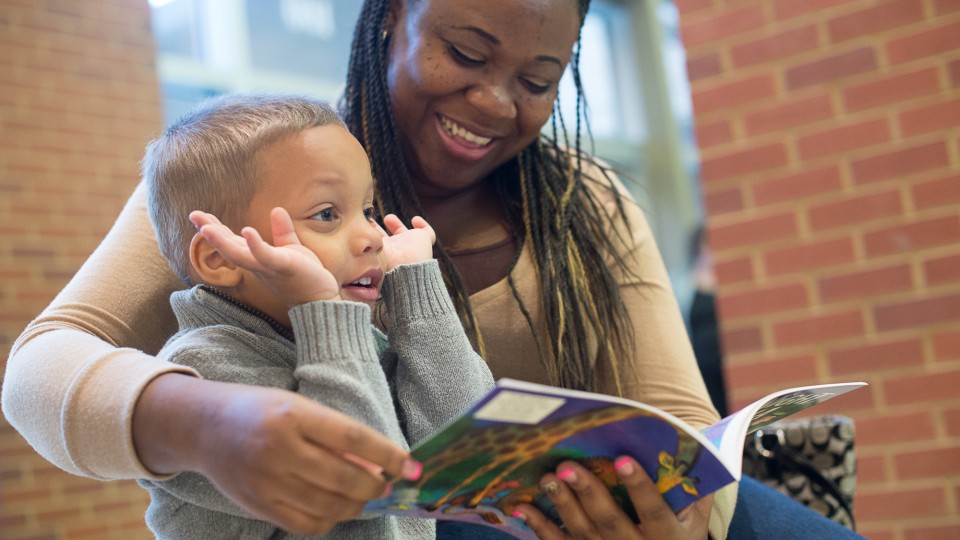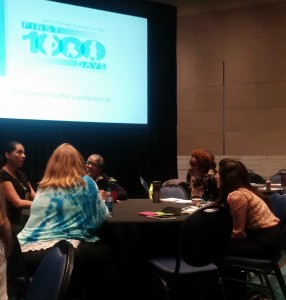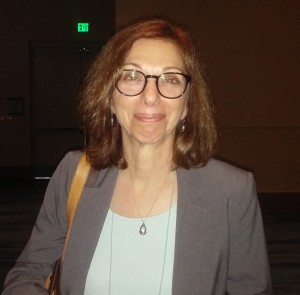Finding ways to bridge early language gaps
- October 23, 2015
- / Reggie Dogan
- / education

Latisha Phillips reads to her son Kellen Phillips,3, during the ECARE family night at Global Learning Academy in Pensacola, Fl., Thursday, February 5, 2015.(Michael Spooneybarger/ Pensacola Today)
Erika Hoff has spent nearly two decades researching, writing and teaching about language development in children.
The Florida Atlantic University psychology professor’s extensive work shows that children who come from poorer families and from homes in which a language other than English is spoken have different — and deficient — language skills from those of children from middle- and upper-class families.
The deficiency almost always shows up when the low-income children reach school age.
But all children can learn more in conversation when they are actively engaged and exposed to a variety of quality language, says Hoff, in her presentation, “The First 1000 Days: Early Language Gaps – Sources and Solutions.”
“When children participate in conversation, they benefit,” Hoff says. “They learn language better and faster when they hear complex different words. You don’t need speech to be oversimplified."
Hoff shared her research with hundreds of participants Thursday, Oct. 22, at the First 1,000 Days Florida Summit in West Palm Beach.
More than 700 practitioners, policymakers, researchers, home visitors and other early childhood staff spent three days learning more about why the first 1,000 days are vitally important to a child’s development and future success in school and life.
Early education and kindergarten readiness are among the 16 key metrics included in the Studer Community Institute’s Pensacola Metro Dashboard.
The first 1,000 days and high-quality child care are critical to the social and emotional development of young children, to their future academic success and to improving a community’s overall quality of life.

Participants at the First 1000 Days Florida Summit gathered in West Palm Beach to discuss ways to help young children develop and reach future success.
Through her years of research, Hoff discovered that as early as nine months experts can recognize differences between children whose parents lack high school degrees compared to those who finished high school and college. Parents lacking education also are more likely to be impoverished.
In Florida, 53 percent of infants and toddlers grow up at or near poverty. Children born into poverty are at greater risk for poorer outcomes. They are more likely to be low birth weight, exposed to substance abuse and experience abuse and neglect than other children.
The best chance to turn this around is during the first 1,000 days, a critical window for learning to see, talk, walk and think, Hoff says.
Hoff pointed out that in the first year of life, 2 million connections in the brain are created per second. It takes nurturing relationships and quality infant care during this critical period of growth to achieve optimal development, Hoff says.
Development of the brain starts at conception and by the 1001st day, the brain has reached 80 percent of its adult size, says Hoff.
The quality of relationships, experiences and language during this critical period lays the foundation for future heath, development and educational achievement, she says.
“The importance of early language skills cannot be underestimated,” she says. “There are serious gaps but there are promising strategies to bridge them.”
A strategy Hoff found instructive and successful is Providence Talks. It is considered one of the most ingenious of several programs across the country that encourages low-income parents to talk more frequently with their young children.
In the program, a child once a month wore a small recording device for the day, and the recording is then analyzed.
An algorithm tallies all the words spoken by adults around her, all the vocalizations the child makes, and all the exchanges in which the child says something and an adult replies, or vice versa.
The award-winning study led the city’s mayor to launch, Providence Talks, an intervention program designed to boost early childhood literacy development and raise the percentage of students who enter kindergarten ready for academic success.
The larger question that arose from the Providence study was whether it could really change something as personal and fundamental as how people talk to their babies, Hoff says.
“In some ways, parenting behavior clearly can change,” she says. “I have a daughter who has a baby now and she does everything differently from how I did it — putting babies to sleep on their backs, not giving them milk until they’re a year old.”
Hoff praised the work of Dana Suskind, and her book, “Thirty Million Words: Building a Child’s Brain.”
Suskind, a medical doctor and professor, is both founder and director of the Thirty Million Words Initiative, which is based on scientific research that demonstrates the critical importance of early language exposure on the developing child.
The program is named after a 1995 study by child psychologists Betty Hart and Todd R. Risley, which showed that at-risk children in Kansas City had heard 30 million fewer words by age 3 than other kids, and that this deficit had a serious impact on their achievement.
“Early childhood policies and investments to reduce identified risks and increased protective factors are key to supporting families in raising healthy and successful children,” Hoff said. “By investing in the first 1,000 days, we can make a significant impact in long-term outcomes for our most vulnerable children and families.”

 CivicCon launches with a look at good growth in cities
CivicCon launches with a look at good growth in cities
 Building stronger brains one baby, one parent at a time
Building stronger brains one baby, one parent at a time
 SCI debuts commercial on Early Learning City
SCI debuts commercial on Early Learning City
 Entrecon: World class speakers and an opportunity to sharpen skills
Entrecon: World class speakers and an opportunity to sharpen skills
 PYP Quality of Life survey 2017
PYP Quality of Life survey 2017
 EntreCon Pensacola 2016: A look back
EntreCon Pensacola 2016: A look back
 Leadership tip: getting better employee takeaways
Leadership tip: getting better employee takeaways
 Leadership tip: be interested instead of interesting
Leadership tip: be interested instead of interesting
 Leadership tip: delivering difficult messages
Leadership tip: delivering difficult messages
 Brain Bags boost Arc, Early Childhood Court programs
Brain Bags boost Arc, Early Childhood Court programs